
Environmental Epidemiology
Scope & Guideline
Unlocking insights into the impacts of our environment on public health.
Introduction
Aims and Scopes
- Environmental Exposure Assessment:
The journal emphasizes rigorous methodologies for assessing environmental exposures, including air and water quality, chemical pollutants, and psychosocial stressors affecting health. - Public Health Outcomes:
It investigates the impact of environmental factors on various health outcomes, such as respiratory diseases, cardiovascular conditions, and developmental disorders in children. - Multidisciplinary Approaches:
The journal fosters interdisciplinary collaboration, integrating fields such as epidemiology, toxicology, sociology, and environmental science to address complex health challenges. - Global Health Perspectives:
Environmental Epidemiology places a strong emphasis on international studies, examining health impacts in diverse populations and advocating for equitable health solutions globally. - Policy and Advocacy:
The journal engages with policy implications of research findings, promoting actionable insights that inform public health initiatives and environmental regulations.
Trending and Emerging
- Climate Change and Health:
Recent publications increasingly address the health impacts of climate change, including heat-related illnesses and the effects of extreme weather events, highlighting the urgent need for climate-resilient health strategies. - Cumulative Exposure Assessments:
There is a growing trend towards studies that evaluate the cumulative impact of multiple exposures, reflecting a more holistic understanding of how various environmental factors interact to influence health. - Social Determinants of Health:
Research is increasingly focusing on the intersections of environmental exposures and social determinants, such as socioeconomic status and access to healthcare, emphasizing health inequities. - Innovative Methodological Approaches:
The journal showcases advances in exposure assessment methodologies, including the use of geospatial analysis and machine learning techniques to better understand health impacts. - Emerging Contaminants and Endocrine Disruptors:
There is a notable increase in studies examining the health effects of emerging contaminants, such as PFAS and neonicotinoids, reflecting growing public concern and regulatory scrutiny.
Declining or Waning
- Single Exposure Studies:
Research focusing exclusively on single environmental exposures is becoming less common, as there is a shift towards understanding the cumulative and interactive effects of multiple exposures. - Descriptive Epidemiology:
There is a noticeable decline in purely descriptive studies that do not incorporate advanced statistical modeling or mechanistic insights into health outcomes. - Localized Studies:
Research centered on localized or specific geographic areas without broader implications or comparisons has decreased, likely due to the journal's emphasis on multi-country and multi-city studies. - Traditional Pollutant Focus:
There is a waning interest in traditional pollutants (e.g., lead, mercury) as new emerging contaminants (e.g., PFAS, microplastics) gain more attention in recent studies.
Similar Journals
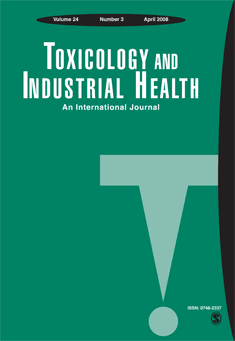
TOXICOLOGY AND INDUSTRIAL HEALTH
Pioneering research at the intersection of health and industry.TOXICOLOGY AND INDUSTRIAL HEALTH, published by SAGE PUBLICATIONS INC, is a premier journal in the field of toxicology, public health, and environmental health, with a significant history dating back to 1985. With its ISSN 0748-2337 and E-ISSN 1477-0393, the journal provides a platform for disseminating groundbreaking research and comprehensive reviews that address the complexities of toxic substances in industrial and occupational settings. Despite its Q3 ranking among peers in health, toxicology, and public health, this journal is becoming increasingly influential, reflected in its growing citation metrics. Researchers and professionals benefit from its commitment to fostering knowledge in both theoretical and practical contexts, making it an essential resource for those dedicated to advancing understanding in this vital field. The journal's main objectives include promoting research addressing the implications of toxicology on health and safety standards across industries, ensuring accessibility to current studies for a global audience. Overall, TOXICOLOGY AND INDUSTRIAL HEALTH plays a critical role in bridging the gap between research and real-world applications, proving invaluable to students, professionals, and researchers alike in their pursuit of enhancing public health and environmental safety.

Journal of Environmental Science and Health Part C-Toxicology and Carcinogenesis
Unraveling the Impact of Environmental ToxinsThe Journal of Environmental Science and Health Part C-Toxicology and Carcinogenesis is a vital publication in the fields of environmental science, toxicology, and cancer research, published by Taylor & Francis Inc. With an ISSN of 2689-6583 and E-ISSN 2689-6591, this journal provides a platform for peer-reviewed research that explores the intersection of environmental factors and health outcomes, particularly focusing on toxicological and carcinogenic impacts. Though it does not currently offer Open Access, it remains a significant contributor to academia with its current ranking in the Q4 category for Cancer Research and Q3 in Health, Toxicology and Mutagenesis. The journal has converged from 2020 to 2024 and aims to disseminate pioneering studies that inform public health policies and foster a deeper understanding of environmental toxins. Aspiring researchers, professionals, and students will find this journal to be an essential resource for the latest findings and discussions within these critical fields.

International Journal of Occupational Medicine and Environmental Health
Elevating discourse on pressing health and environmental challenges.The International Journal of Occupational Medicine and Environmental Health is a distinguished journal dedicated to advancing the fields of occupational medicine and environmental health. Published by NOFER Institute of Occupational Medicine in Poland, this open-access journal has been providing a platform for innovative research since 2011. With an ISSN of 1232-1087 and an E-ISSN of 1896-494X, it allows for wide dissemination of findings that address contemporary challenges in public health, occupational settings, and environmental issues. The journal has established itself as a vital resource, achieving a Q3 ranking in both Medicine (miscellaneous) and Public Health, Environmental and Occupational Health categories as of 2023, reflecting its commitment to quality and relevance. With a Scopus rank of #295 out of 665 in its domain, it places in the 55th percentile, affirming its growing impact within the scientific community. Researchers, professionals, and students seeking to enhance their knowledge and contribute to the discourse will find the rich content and comprehensive studies presented in this journal invaluable. Explore cutting-edge research from 1994 to the present, and join the conversation on occupational and environmental health issues that profoundly affect global communities.

EUROPEAN JOURNAL OF EPIDEMIOLOGY
Transforming data into actionable public health strategies.The European Journal of Epidemiology is a premier peer-reviewed journal published by Springer, specializing in the vast and critical field of epidemiology. With its ISSN 0393-2990 and E-ISSN 1573-7284, this journal has been a leading platform for disseminating high-quality research since its inception in 1985, encompassing a comprehensive range of topics pertinent to public health and epidemiological science. Proudly based in the Netherlands, the journal has secured a prestigious Q1 ranking in the field of Epidemiology and boasts an impressive Scopus rank of #8 out of 148 in its category, placing it in the 94th percentile among its peers. With a commitment to advancing knowledge and practice in epidemiology, the journal provides invaluable insights for researchers, healthcare professionals, and students, facilitating a better understanding of disease distribution and determinants in populations. While it operates under a subscription model, the European Journal of Epidemiology continues to uphold its reputation as an essential resource for innovative research and public health advancements through the years.
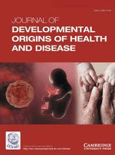
Journal of Developmental Origins of Health and Disease
Advancing Insights into Health from Early DevelopmentThe Journal of Developmental Origins of Health and Disease is a premier academic publication under the esteemed Cambridge University Press, dedicated to advancing the understanding of how developmental processes influence health outcomes across the lifespan. With an ISSN of 2040-1744 and an E-ISSN of 2040-1752, this journal has established itself as a critical resource in the field of medicine, currently positioned in the Q2 category of Medicine (miscellaneous). Having converged from 2010 to 2024, this journal reflects a significant commitment to exploring the interconnections between early development and subsequent health conditions. Ranked 147 out of 398 in its category according to Scopus, it retains a commendable 63rd percentile status, highlighting its contributions to this rapidly evolving field. Though it does not offer open access, the journal remains a vital platform for researchers, professionals, and students interested in uncovering the intricate links between developmental biology and public health challenges.
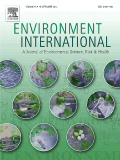
ENVIRONMENT INTERNATIONAL
Advancing Environmental Knowledge for a Sustainable FutureENVIRONMENT INTERNATIONAL is a premier journal dedicated to advancing the field of environmental science. Published by PERGAMON-ELSEVIER SCIENCE LTD, it boasts an impressive impact factor and holds a prestigious Q1 classification in the Environmental Science category, reflecting its influence and reputation within academia. Since transitioning to Open Access in 2019, the journal has increased its accessibility, allowing a wider audience—from researchers to industry professionals—to engage with cutting-edge studies that address crucial environmental challenges. With a Scopus rank of #3 out of 233 in General Environmental Science and a commendable 98th percentile, ENVIRONMENT INTERNATIONAL is committed to publishing high-quality research that informs policy and practice. Covering a broad spectrum of topics from pollution and climate change to sustainable development, this journal serves as a vital resource for those dedicated to making a positive impact on our planet. For submissions, inquiries, or to explore its extensive archives dating from 1976 to 2024, please visit their site at the Kidlington, Oxford headquarters.
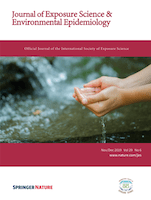
Journal of Exposure Science and Environmental Epidemiology
Illuminating Connections Between Pollution and HealthJournal of Exposure Science and Environmental Epidemiology, published by SPRINGERNATURE in the United Kingdom, is a leading platform for researchers and practitioners dedicated to understanding the interplay between environmental factors and human health. With an impressive impact factor and Q1 and Q2 rankings across multiple categories such as Pollution and Public Health, the journal has established itself as a critical resource in the fields of epidemiology, toxicology, and environmental science. Covering a wide spectrum of studies from 2006 to 2024, it aims to disseminate timely research that empowers professionals and informs policy decisions. Although there is no open access option at this time, the journal's rigorous peer-review process ensures that only high-quality research is published, further cementing its reputation as a vital source of knowledge for advancing public health and environmental protection.

Exposure and Health
Connecting environmental science with health outcomes for a better future.Exposure and Health is a pioneering journal published by Springer, specializing in the interdisciplinary fields of health, toxicology, and environmental sciences. With an ISSN of 2451-9766 and E-ISSN of 2451-9685, this open-access journal exemplifies a commitment to disseminating high-quality research that informs public health practices and policies globally. Situated in the Netherlands, it boasts an impressive impact factor and ranks in the top quartile (Q1) across multiple categories in the 2023 Scopus rankings, including Health, Toxicology and Mutagenesis, Pollution, and Water Science and Technology. The journal is dedicated to advancing knowledge on the interactions between environmental factors and health outcomes, making it a vital resource for researchers, professionals, and students in these critical fields. Exposure and Health actively encourages submissions that address the challenges of exposure assessment, risk management, and the promotion of sustainable public health initiatives.
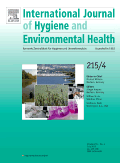
INTERNATIONAL JOURNAL OF HYGIENE AND ENVIRONMENTAL HEALTH
Elevating standards in public health with rigorous scholarship.International Journal of Hygiene and Environmental Health, published by Elsevier GmbH, stands at the forefront of research in the fields of public health, environmental, and occupational health. With an impressive impact factor that underscores its significance—ranking #30 out of 665 journals in its category, placing it within the top 5%—the journal is a vital resource for academics and professionals seeking to expand their knowledge and contribute to advancements in the field. Since its inception in 2000, the journal has continually evolved, with its Q1 quartile designation reflecting its high-quality contributions and rigorous peer-review process. Accessible to a global audience, it offers flexible open access options, promoting the dissemination of critical findings on hygiene and environmental health issues. Published in Germany, the journal serves as an essential platform for researchers, educators, and practitioners to share innovative studies, timely reviews, and insightful discussions, driving forward the dialogue on public health challenges and solutions in today's world.
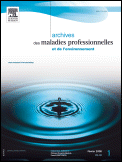
Archives des Maladies Professionnelles et de l Environnement
Connecting Research with Real-World ImpactArchives des Maladies Professionnelles et de l'Environnement is a vital scholarly journal published by Elsevier Science Inc, focusing on the critical intersections of public health, environmental issues, and occupational health. With an ISSN of 1775-8785 and an E-ISSN of 1778-4190, this French-based journal serves as a platform for researchers, professionals, and students to explore contemporary challenges and advancements in these essential fields. Although it holds a Q4 ranking in the 2023 Scopus quartiles, it provides a unique opportunity for new contributions that can drive future research directions. The journal accepts a variety of article types, with the aim of spreading knowledge that can influence policy and improve practices in occupational health and environmental safety. As we approach the convergence of its publication years from 2004 to 2024, the journal remains committed to fostering a comprehensive understanding of the impact of work and environmental exposure on health, making it an important resource for anyone invested in these disciplines.